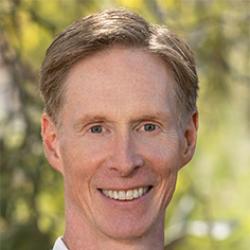Frank Fritz

- B.A., cum laude, Williams College
- J.D., Columbia University School of Law
Frank Fritz
Frank Fritz serves as a Senior Fellow and adjunct professor at the UNLV William S. Boyd School of Law. He focuses on developing legal techniques to fight climate change and is the founder of the Climate and Sustainability Law Project at Boyd.
As part of the Legal Barriers to Decarbonization team for Nevada’s 2020 State Climate Strategy, he led a team of Boyd students and faculty providing legal research and policy recommendations to the Nevada Office of Attorney General, which reviewed the research before incorporation in the final report. He is a model law drafter for Legal Pathways to Deep Decarbonization, a nationwide pro bono project that drafts and publishes model laws to reduce greenhouse gas emissions in the United States.
One of his strengths is reaching compromise among multiple stakeholders in contentious, complex and high profile environmental cases. Before joining the law school, he spent 24 years at the U.S. Environmental Protection Agency (EPA), as a staff attorney and supervisor, practicing law under multiple statutes, including the Comprehensive Environmental Response, Compensation, and Liability Act (CERCLA or Superfund); the Resource Conservation and Recovery Act (RCRA); the Clean Air Act and the Emergency Planning and Community Right-to-Know Act (EPCRA). He also has significant experience with the federal Freedom of Information Act. He won multiple awards for his work, including a team Silver Medal for Superior Service, the second highest honor awarded by EPA.
Before that, he was a litigation associate at Debevoise & Plimpton in New York City. He clerked for Judge Robert E. Cowen of the U.S. Court of Appeals for the Third Circuit and Chief Judge Thomas C. Platt of the Eastern District of New York.
He received his J.D. from Columbia University School of Law, where he was the editor-in-chief of the Columbia Journal of Environmental Law, and his B.A., cum laude, with Honors in Physics, from Williams College. After college, he worked at AT&T Bell Laboratories, researching and developing fabrication techniques for very large-scale integrated circuits.